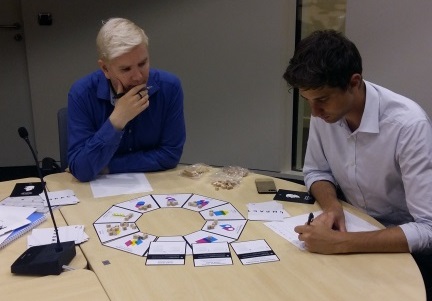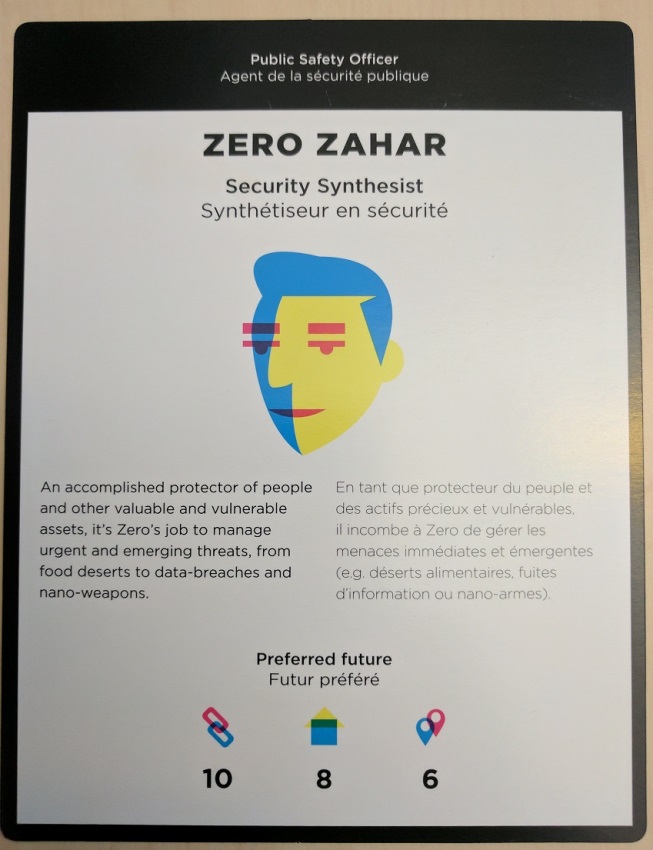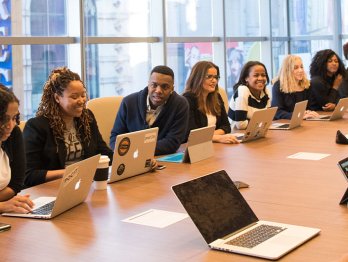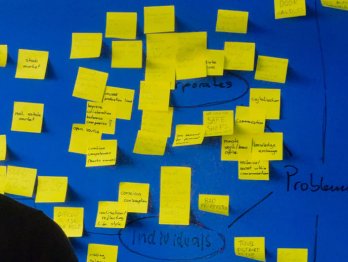Playing to Innovate

Wouldn’t it be great if you could play games at work? Sorry, I meant, wouldn’t it be great if you could play games at work and learn new skills at the same time? Here at the Observatory we’re interested in finding out more about how playing games can help public servants learn new ways of thinking and doing things.

As part of our innovation lifecycle work, we want to better understand how to support public servants and their organisations in exploring and maybe adopting new methods and tools. While there are various mechanisms such as toolkits and training, we also thought it would be worth looking at what “serious games” can offer. These are games that aren’t just about play, but are about play that has serious impact.
One such serious game is Impact: A Foresight Game, developed by Policy Horizons Canada (you can read more about their work on our database). Horizons developed the game in order to:
- challenge and enable individuals to experiment with serious games as an alternative policy tool
- learn about and apply strategic foresight methods
- build awareness of the work and research of Horizons.
The game was developed primarily for the Canadian federal public service, however the firm that developed the game then ran a crowdfunding campaign to make the game available for others.
One of the OPSI team members participated in the campaign and recently received the game, and so a few of us had an initial play over a lunchtime (the game is for between 3 and 6 players and goes for between 60 and 90 minutes).
The game set-up is pretty straightforward. You have a set of different “domains” tiles which represent different aspects of our world, such as services, energy, home, or work. These tiles are then placed in a circle and set the scene for the game, and where “influence cubes” are allocated. The aim of the game is to get enough influence cubes on the domains that match your specific win condition.
The win condition is set out on your “Job from the Future” card. I received the card for “Public Safety Officer” – Zero Zahar, a security synthesist. Zero is “An accomplished protector of people and other valuable and vulnerable assets, it’s Zero’s job to manage urgent and emerging threats, from food deserts to data-breaches and nano-weapons.” Zero needed lots of cubes for the security domain, quite a few in the home domain, and some in the transportation domain.

Each turn of the game involves each player choosing from the three Impact cards that they have in their hand, which sets out some possible developments and that have two impacts on the domains. So, for instance, one impact card that was played during our game was “Remote Controlled Robt Geologists” where brain computer interface technologies allow geologists and mining engineers to remotely study active mine sites. It has a positive impact on natural resources because qualified personnel can consult on active mines without geographic limitations. and a negative impact on one other domain.
That’s where the game got interesting – for some cards, where you had the chance to add or take or move cubes from a domain, you then had to argue why the change would have that impact on that domain, using the logic of the card. So, for instance, you might argue that this card would have a negative impact on transport, because you’d argue it represented a reduced need for people to go to job sites. Or if it had been a positive impact, maybe you’d argue that it would be good for the home domain, because it meant that people would have to travel less for work, and could stay with their families. So to win, and move the influence cubes to where you want, you have to think about how these possible scenarios would play out in different parts of our system.
At the end of the round, all of the cards are placed face-up and all the players bar one have to then generate a “Headline of an Era”, drawing from the developments represented by each of the cards. It was quite tricky to try and pull together the different developments into one idea, and it took a little bit of practice, but I think we started to get much better at it by the end of the game. The best headline of the round, which determines the person who could then allocate some extra cubes to their chosen domains, was chosen by a rotating judge.
Coming from a background with experience in foresight and horizon scanning, I found playing the game quite a bit of fun (despite not winning…). It was easy to get across the basics, and I thought the game was well structured. It introduces both new content and ways of helping people think about the future differently. My two colleagues who played the game with me, and who are not as familiar with foresight, also found it interesting and easy introduction to futures thinking.
So, if you think it’s an area that might be of interest, I’d recommend giving Impact a look. It brings together the power of imagination (the “Headline of an Era” can be quite creative!) and helps encourage you to think about not only how things are now, but how emerging trends and development might lead to very different outcomes. I can see that a few games would really help make people more comfortable with the techniques, as well as introducing them in a safe way that could easily carry over to the day-to-day work. Through humour and team bonding it also provides a chance to think outside the box and confront different assumptions about the future.
Another serious game for the public sector that I have heard of (but not played) is the Game of Life 2050 from the European Commission, which looks at system change and tackling complex challenges.
Are there other serious games out there that you have seen or played? And that relate to the public sector and introducing new approaches or methods?
I’m interested in hearing from people who have played serious games and how that experience might have been useful for introducing new tools and approaches into a public sector context. Do you think innovation capability can be helped by serious games? Let us know, either through our LinkedIn Group or by email.












